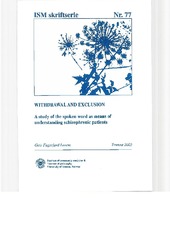Withdrawal and exclusion : a study of the spoken word as means of understanding schizophrenic patients
Permanent link
https://hdl.handle.net/10037/25926Date
2005Type
Doctoral thesisDoktorgradsavhandling
Author
Lorem, Geir FagerjordAbstract
There are literally thousands of people living among us who suffer from chronic and
severe mental illness. There may be as many as one out of 100 that might be described with the
diagnosis of schizophrenia. This means that most of us are likely to know, or know of, at least
one person who suffers from schizophrenia. Nevertheless, most people perceive it as both distant
and elusive.
The diagnostic description and characterization of Schizophrenia (DSM-IV, 1994:273ff; ICD-10, 1994:F20), says little about the experience of the illness or of the individuality of persons within the group (of Mishara, 1994). It says little concerning who the patients are as persons, what their lives are like and how they experience themselves and others. It is easy to forget that schizophrenia is an illness that strikes individuals. The experience of schizophrenia thus will be unique for each person (Strauss, 1989; Strauss, 1996; Strauss, 1994). This study was triggered by the question of what is it like to experience a disorder like schizophrenia and the isolation that is associated with it.
The intention of this study is to describe some aspects of the condition and the suffering that schizophrenia represents. I was therefore granted access to a rehabilitation unit in a hospital in order to enter into dialogue with patients and staff about schizophrenia and the suffering involved. I also wanted to study how it manifests itself in everyday life.
The diagnostic description and characterization of Schizophrenia (DSM-IV, 1994:273ff; ICD-10, 1994:F20), says little about the experience of the illness or of the individuality of persons within the group (of Mishara, 1994). It says little concerning who the patients are as persons, what their lives are like and how they experience themselves and others. It is easy to forget that schizophrenia is an illness that strikes individuals. The experience of schizophrenia thus will be unique for each person (Strauss, 1989; Strauss, 1996; Strauss, 1994). This study was triggered by the question of what is it like to experience a disorder like schizophrenia and the isolation that is associated with it.
The intention of this study is to describe some aspects of the condition and the suffering that schizophrenia represents. I was therefore granted access to a rehabilitation unit in a hospital in order to enter into dialogue with patients and staff about schizophrenia and the suffering involved. I also wanted to study how it manifests itself in everyday life.
Publisher
Universitetet i TromsøUniversity of Tromsø
Series
ISM skriftserie Nr. 77, 2005Metadata
Show full item recordCollections
- ISM skriftserie [161]
Copyright 2005 The Author(s)


 English
English norsk
norsk